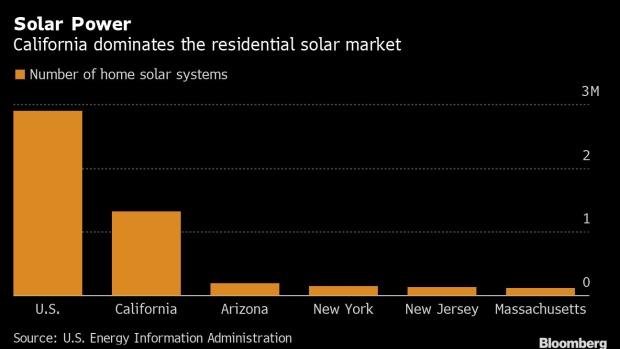Dec 13, 2021
California Proposes Deep Cut to Rooftop Solar Incentives
, Bloomberg News

(Bloomberg) -- California regulators proposed sharply reducing subsidies for residential solar systems in what would be the first major reform to a popular green-energy program that helped jump-start the rooftop solar industry.
Residential solar customers would get a lower credit for their excess energy sent to the grid based on the value of the energy costs avoided by utilities, according to a proposed decision issued Monday by a judge at the California Public Utilities Commission.
The credits would range from less than 10 cents to about 30 cents per kilowatt-hour, depending on the time of day, Commissioner Martha Guzman Aceves in an interview. Solar customer in the state currently receive credits equal to the retail rate for power, which ranges from about 17 to 44 cents per kilowatt-hour during the summer in Southern California.
The new proposal also calls for solar users to pay a new grid-connection charge that would average about $40 a month.
Shares of Sunrun Inc., the largest rooftop solar installer, fell as much as 4.8%. SolarEdge Technologies Inc. fell 2.2%.
The proposed amendments will undoubtedly impact the business of bolting solar panels on roofs across the U.S., an industry valued at more than $13 billion a year. A deep cut to incentives would likely slow installations in the largest solar state and prompt other sunny jurisdictions to follow. The issue has divided solar firms, consumer groups, environmental advocates and utilities.
New residential rooftop solar customers would get a four-year credit to help them transition to the new rates that would allow them to pay back the cost of a solar and energy storage system over 10 years, Aceves said.
The intent of the sweeping changes to the popular program is to get more customers to help the state deal with the need for more supplies in the evening during the so-called “net peak” when solar isn’t available and expensive natural-gas plants are needed to meet demand, Aceves said.
“The reform is about incentivizing the right thing we need today for the grid for the benefit of all ratepayers, and that is reducing our net peak,” she said.
Parties have a chance to respond to the proposal and the five-member commission will ultimately decide on the nature of the reforms by early next year.
Bill Credits
California’s solar incentive program -- known as “net energy metering” -- currently gives residential solar users a bill credit equal to the full retail price of power for any excess electricity they send to the grid. The subsidy helped spur the installation of 1.3 million home solar systems in the state, about 45% of the nationwide total. Regulators have been weighing changes to the program to ensure it is fair and maximizes the value of such systems for all customers.
California’s big investor utilities argue that solar incentives have resulted in a massive shift of costs to customers who can’t install or afford the solar arrays. Those utilities -- PG&E Corp., Southern California Edison and San Diego Gas & Electric -- jointly proposed a sharp decrease in bill credits and new monthly connection charges approaching $100. The utilities say these changes are needed to make sure solar users pay for their share of the costs of maintaining and upgrading the power grid as well as contribute to public service programs.
Consumer ratepayer advocates and the Natural Resources Defense Council, an environmental advocacy group, also say the program needs to be reformed, noting that the incentive mostly benefits higher-income homeowners with the costs mostly falling to low-income customers.
The solar industry has pushed back on these arguments. They say the utilities are mostly interested in protecting their monopolies and trying to stifle competition from alternative clean-energy providers. Solar installers and their allies, including local environmental advocates, said the proposals by utilities would be devastating to the economic value of rooftop systems.
The California Solar and Storage Association, which lobbies on behalf of solar installers, has proposed a more gradual reduction of bill credits that will also help with the adoption of home battery systems, which can discharge power to the grid when needed later in the day.
(Adds context in the third paragraph and share decline in the fifth.)
©2021 Bloomberg L.P.


